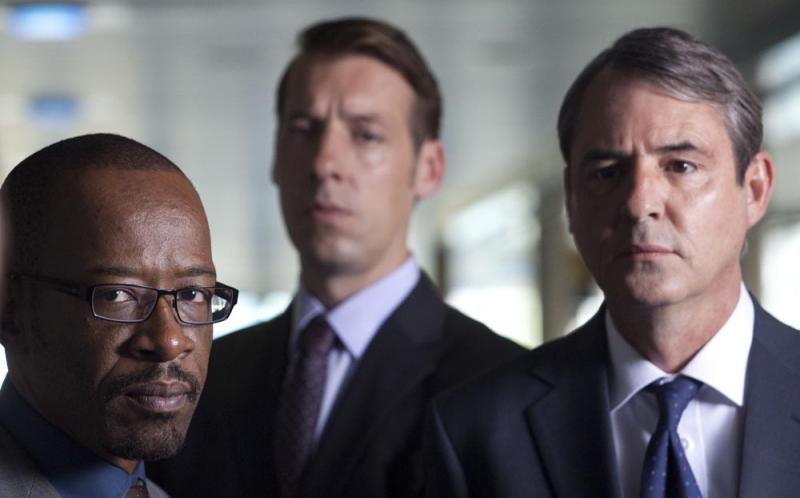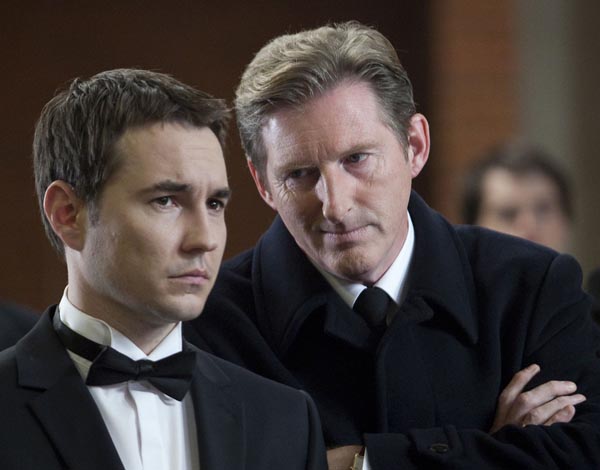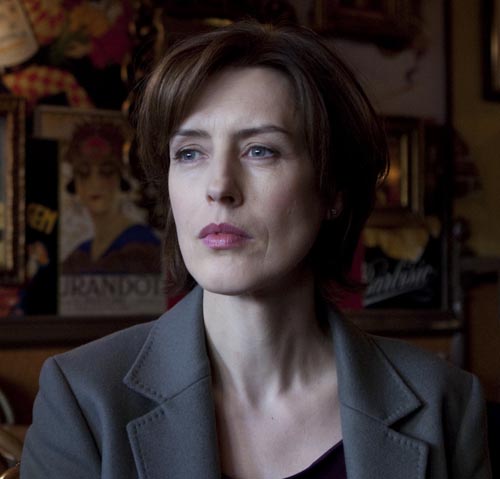Line of Duty, BBC Two | reviews, news & interviews
Line of Duty, BBC Two
Line of Duty, BBC Two
Fuzz opera in which bureaucracy and box-ticking replace thief-taking

Those quaint old TV shows in which we were invited to support and admire the police unreservedly have long been overtaken by real-life events. Now evolution has brought us to Line of Duty, a series that presents the police as a failing bureaucracy hamstrung by paperwork and political correctness.
Perhaps writer Jed Mercurio picked up a few extra tips by watching the BBC in action, with its preposterous thickets of regulations about compliance and heath and safety. In any event, he hasn't been too bothered about nuance and subtlety. The opening scene of this first episode depicted a tense raid by anti-terrorist police on a flat supposedly housing a jihadist bomb-maker, but as DS Steve Arnott (Martin Compston) was on the point of ordering his lads into action, he received a terse radio message insisting that he had to complete his risk assessment paperwork.
 This sort of thing obviously wasn't helping to sharpen the effectiveness of his squad, who proceeded to burst into the wrong flat and kill an innocent man holding a baby. They were promptly ordered by a senior officer to concoct bogus statements claiming that the victim acted aggressively and they had no option but to shoot him.
This sort of thing obviously wasn't helping to sharpen the effectiveness of his squad, who proceeded to burst into the wrong flat and kill an innocent man holding a baby. They were promptly ordered by a senior officer to concoct bogus statements claiming that the victim acted aggressively and they had no option but to shoot him.
But that was just the preamble. Arnott was moved sideways as a result of this... what shall we call it... misunderstanding, and now finds himself under the mirthless auspices of Superintendent Hastings (Adrian Dunbar, pictured above with Compston) in the anti-corruption unit AC-12. Hastings is obsessed with proving that feted super-cop DCI Tony Gates (Lennie James) is fiddling the statistics and bending the rules to make himself look like an over-achiever. Among other things, he's supposedly guilty of "laddering", which means you find somebody who's committed a crime and then load an additional heap of offences onto the charge sheet. Moreover, in modern policing there's no such thing as a free breakfast, as Gates discovers when he's accused of having eaten one.
 It all contributes to a portrait of the police force as a paranoid, cynical and humourless place, where any signs of excellence are sabotaged by back-stabbing sneaks as they claw their way up the greasy pole of career advancement. Rather like the old Soviet Union, box-ticking is the route to the top, rather than ability (look no further than Gates's repulsive pair of smirking sidekicks, messrs Cottan and Morton). Actual crime-fighting barely figures on the list of priorities, and there's a lot of clumsy incidental stuff about cops feigning "empathy" for crime victims or spouting brain-dead jargon like "downprocess" and "gender balance".
It all contributes to a portrait of the police force as a paranoid, cynical and humourless place, where any signs of excellence are sabotaged by back-stabbing sneaks as they claw their way up the greasy pole of career advancement. Rather like the old Soviet Union, box-ticking is the route to the top, rather than ability (look no further than Gates's repulsive pair of smirking sidekicks, messrs Cottan and Morton). Actual crime-fighting barely figures on the list of priorities, and there's a lot of clumsy incidental stuff about cops feigning "empathy" for crime victims or spouting brain-dead jargon like "downprocess" and "gender balance".
Gates, who initially you might have mistaken for the "hero" of the piece, is obviously into all sorts of off-piste activities, even if they may not be the ones Hastings suspects him of. He's being dragged into extremely murky waters through his extra-marital relationship with Jackie Laverty (Gina McKee, pictured above), who has apparently killed a man in a hit-and-run accident and has ever-so-subtly persuaded Gates to cover it up for her. Snag is, you wouldn't care much if the entire cast was wiped out in a gigantic explosion.
Add comment
Subscribe to theartsdesk.com
Thank you for continuing to read our work on theartsdesk.com. For unlimited access to every article in its entirety, including our archive of more than 15,000 pieces, we're asking for £5 per month or £40 per year. We feel it's a very good deal, and hope you do too.
To take a subscription now simply click here.
And if you're looking for that extra gift for a friend or family member, why not treat them to a theartsdesk.com gift subscription?
more TV
 Road Diary: Bruce Springsteen and the E Street Band, Disney+ review - the Boss grows older defiantly
Thom Zimny's film reels in 50 years of New Jersey's most famous export
Road Diary: Bruce Springsteen and the E Street Band, Disney+ review - the Boss grows older defiantly
Thom Zimny's film reels in 50 years of New Jersey's most famous export
 Industry, BBC One review - bold, addictive saga about corporate culture now
Third season of the tale of investment bankers reaches a satisfying climax
Industry, BBC One review - bold, addictive saga about corporate culture now
Third season of the tale of investment bankers reaches a satisfying climax
 Rivals, Disney+ review - adultery, skulduggery and political incorrectness
Back to the Eighties with Jilly Cooper's tales of the rich and infamous
Rivals, Disney+ review - adultery, skulduggery and political incorrectness
Back to the Eighties with Jilly Cooper's tales of the rich and infamous
 Disclaimer, Apple TV+ review - a misfiring revenge saga from Alfonso Cuarón
Odd casting and weak scripting aren't a temptation to keep watching
Disclaimer, Apple TV+ review - a misfiring revenge saga from Alfonso Cuarón
Odd casting and weak scripting aren't a temptation to keep watching
 Ludwig, BBC One review - entertaining spin on the brainy detective formula
David Mitchell is a perfect fit for this super-sleuth
Ludwig, BBC One review - entertaining spin on the brainy detective formula
David Mitchell is a perfect fit for this super-sleuth
 The Hardacres, Channel 5 review - a fishy tale of upward mobility
Will everyday saga of Yorkshire folk strike a popular note?
The Hardacres, Channel 5 review - a fishy tale of upward mobility
Will everyday saga of Yorkshire folk strike a popular note?
 Joan, ITV1 review - the roller-coaster career of a 1980s jewel thief
Brilliant performance by Sophie Turner as 'The Godmother'
Joan, ITV1 review - the roller-coaster career of a 1980s jewel thief
Brilliant performance by Sophie Turner as 'The Godmother'
 The Penguin, Sky Atlantic review - power, corruption, lies and prosthetics
Colin Farrell makes a beast of himself in Batman spin-off
The Penguin, Sky Atlantic review - power, corruption, lies and prosthetics
Colin Farrell makes a beast of himself in Batman spin-off
 A Very Royal Scandal, Prime Video review - a fairly sound reimagining, but to what end?
The acting is first-rate, but it has no satisfying dramatic goal
A Very Royal Scandal, Prime Video review - a fairly sound reimagining, but to what end?
The acting is first-rate, but it has no satisfying dramatic goal
 Nightsleeper, BBC One review - strangers on a runaway train
Six-part thriller goes off the rails
Nightsleeper, BBC One review - strangers on a runaway train
Six-part thriller goes off the rails
 The Perfect Couple, Netflix review - an inconvenient death ruins lavish Nantucket wedding
Liev Schreiber steals the show in adaptation of Elin Hilderbrand's novel
The Perfect Couple, Netflix review - an inconvenient death ruins lavish Nantucket wedding
Liev Schreiber steals the show in adaptation of Elin Hilderbrand's novel
 Sambre: Anatomy of a Crime, BBC Four review - satisfying novelistic retelling of a French true crime saga
Compelling story of a rapist who hid in plain sight for 30 years
Sambre: Anatomy of a Crime, BBC Four review - satisfying novelistic retelling of a French true crime saga
Compelling story of a rapist who hid in plain sight for 30 years

Comments
The pathetic initial 10
Your comment has not aged